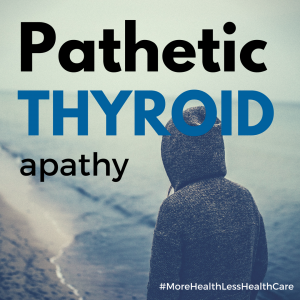
I am really starting to feel bad for other other doctors that work in a traditional setting. Under the surface, over 80% of doctors in this country are disillusioned with medicine and over 60% are considering quitting in the next 2 years. But most people in the healthcare service industry are pretty good at hiding that painful reality…until lately.
I’m seeing more and more lab results from patients that went to their doctor with a genuine concern that is affecting their life. I can’t tell you how many people have showed me those labs, looking at their thyroid specifically, with ONLY a TSH and maybe some metabolic markers and were told, ‘you’re fine.’
 The other day, I got one with just a TSH and vitamin D and she was told her thyroid was all good. I’ve come to the conclusion that it’s not lazy healthcare, it’s pathetic and apathetic healthcare. If someone is coming to me with a list of complaints asking for me to help figure out what it could be, I’m going to dig. Running a panel of 2 values just shows me that doctor is done caring. Time to find a new one.
The other day, I got one with just a TSH and vitamin D and she was told her thyroid was all good. I’ve come to the conclusion that it’s not lazy healthcare, it’s pathetic and apathetic healthcare. If someone is coming to me with a list of complaints asking for me to help figure out what it could be, I’m going to dig. Running a panel of 2 values just shows me that doctor is done caring. Time to find a new one.
Let’s dive into what a full assessment might look like for your thyroid.
There’s a host of symptoms that can arise with a thyroid imbalance: fatigue, cold sensitivity, constipation, dry skin, unexplained weight gain, difficulty losing weight, brittle nails, constipation, enlarged thyroid, high cholesterol, irritability, sensitivity to cold, sexual dysfunction, slow heart rate, sluggishness, or irregular uterine bleeding. But guess what? There’s a host of other issues that can cause these as well.
How do you know if your doctor is apathetic? They run tests, deem them ‘normal’ and end the discussion, even though you are struggling. If you persist, they hand you off to a ‘specialist’ or suggest you take an antidepressant to numb you to what you’re feeling. If my wife had these symptoms, was told that her labs were fine, and there was no plan to look at potential other causes, we would find another doctor.
I would want a doctor that can assess these values below from a functional perspective. I’ve had patients go to their regular doctor to order these with the response of, “I can order these but you’ll have to find someone else to tell you what they mean.” Pathetic.
TSH
As much as I bag on only ordering a TSH, there is value in it. If your thyroid health is a puzzle, this is a piece of the full picture. Thyroid Stimulating Hormone (TSH) is a communication hormone from your brain (pituitary) to your body (thyroid). There’s two main problems with ONLY ordering this though. First is that the ‘normal’ reference range is too broad. Second is that if TSH is out of range, it never gives context as to why. The rest of the values listed help with that context. We all get sick of the media taking quotes out of context. Only testing a TSH is no different.
“Doctors should be telling their patients, ‘I’m going to normalize your TSH, but you’re going to be at a higher risk for gaining weight, experiencing depression and fatigue. It is also more likely that your cholesterol will go up.’ That’s what we should be telling patients, based on our study.”
T4
Approximately 95-97% of thyroid hormone output is T4. There are two ways to assess T4. There is a total value and there is a free value. Only about 3% of T4 is free and able to be converted to T3 in peripheral tissues. The free value is more accurate of thyroid function but the total will give context as to how long this can be maintained. I have many times seen a good range of free T4 but the total T4 is low. What’s not free is bound to a protein acting as storage (more about this later). As the body needs more T4, the bound version will be freed up. The scenario of normal free T4 with a low total T4 tells me the body is doing everything to adapt to maintain current function.
It’s like if you lost your job and you’re spending your savings to maintain your current lifestyle to keep up with the Jones’. At some point, those stores can’t keep up with demand and you get exposed. At this point, most are put on Synthroid, the synthetic version of T4. This situation is more analogous to how our government spends money. They keep increasing programs and hiring people when there’s no financial way to support it, driving a nation into trillions of dollars worth of debt.
As you add synthroid or some other synthetic version of T4, the thyroid sees there is ample amount and backs off its own production of T4. The longer you’re on the med, the more your thyroid gets lazy since some thing else is doing the work. This is more like a welfare situation where the recipient of funds has no intentions of finding gainful employment and does everything possible to qualify for those funds.
T3
Like T4, you have two categories of T3, Free and Total. T3 is the bioavailable thyroid hormone. Just like with T4, both give context to the situation analogy of keeping up with the Jones’. It is produced from T4 by removing an iodine from enzymes contained primarily in the liver and epithelial cells (cells that line blood vessels and organs throughout the body). I mentioned T3 is formed by removing an iodine molecule. Depending on what position of the thyroid hormone this is taken from will dictate whether T3 is produced or Reverse T3 (again, more about this below).
The enzymes that remove iodine are dependent on selenium. This is why you will see many thyroid support supplements contain iodine and selenium. If you are deficient in selenium, this can cause a conversion problem of T3 from T4. So it’s not really something wrong with your thyroid but a peripheral conversion problem affecting the thyroid. Your body won’t sit by idly, it will communicate to the pituitary to produce more TSH to kick start the thyroid to produce more T4, to hopefully convert to enough T3 to make up the difference.
T3 has the greatest affinity for nuclear receptors, meaning it loves to bind to DNA. That’s why the thyroid will be affected by as well as affect virtually every system in the body (I am still massively confused about affect versus effect, hopefully I used them correctly). The thyroid, or any organ, never operates in isolation and to assess and treat the thyroid as such is apathetic and pathetic healthcare.
Reverse T3
I hinted at this above. Reverse T3 is another form of T3. Where T3 is very biologically active, Reverse T3 is biologically inactive. Therefore it is an antagonist to the thyroid. In other words, it may occupy a thyroid receptor to prevent the T3 from occupying that seat to create a response. Why would the body block its own function? I keep saying it and I’ll say it again. The body NEVER does stupid stuff.
[bctt tweet=”I keep saying it and I’ll say it again. The body NEVER does stupid stuff.” username=”DrKurtDC”]
Because T3 is so powerful, the body builds in checks and balances to prevent too much power and stimulation. It’s like our government. We have branches that keep the president in check to avoid too much power. So for those that are freaking out about a Trump presidency and think that he has the power to personally deport whomever he wants at his command, play with the nuclear button like it’s an Atari, and revoke any and every human civil right already granted to a minority group, RELAX. The president doesn’t have that much power.
The other useful situation for Reverse T3 is to conserve energy. The body is split into growth functions and protective functions. Depending on your external circumstances and life experiences, the body will always shift to whatever will serve you best. More often than not, we are in a situation that is perceived as dangerous, and therefore functions to support surviving the next 30 seconds are enhanced at the expense of functions that will support the next 30 years.
Your thyroid has immense influence on your long term health with neurological development, GI motility, metabolism, immune function, digestion, sleep, cognitive function, etc. If you are running from a bear, you could care less about remembering your grocery list, those last 5 lbs you can’t lose, catching the flu, or finding a bathroom.
This is the brilliance of your body producing Reverse T3. It conserves all the energy needed from growth and recovery to facilitate running from a bear so your body can redirect it to appropriate measures like cardiac output, muscle contraction, blood vessel constriction, blood sugar elevations, and sensitivity to your surroundings. By assessing Reverse T3, this gives massive context to the thyroid equation. It’s activated by inflammation, stress, injury, illness, and or severe nutrient depletion.
Since you produce both T3 and Reverse T3, it’s handy to know the ratios (Free T3/Reverse T3) to give you insight into how T4 is being converted. A low conversion ratio (under 0.2) means the tissues are preferentially making Reverse T3 over Free T3 and unless the underlying deficiencies and toxicities are addressed, no amount of synthetic hormone will be successful in creating health.
I would argue this is why all the research and people’s personal experience of having their TSH being chased and ‘normalized’ with synthetic T4 or T3 and they still feel like crap. The body never does stupid stuff so even when your doctor tries to outsmart it by adding hormones it’s not going to work.
T3 Uptake
T3 Uptake actually has little do with T3 but is more of a measurement of thyroid hormone binding ratios. Remember that both T4 and T3 are mostly bound to proteins. When T4 or T3 are unbound, this is the free version and therefore the more active version. For the thyroid, the main protein is called Thyroid Binding Globulin.
For this test the lab puts some radioactive T3 along with a binding resin in your blood. Your blood should contain Thyroid Binding Globulin (TBG). If the radioactive T3 is not able to bind to your protein, it will bind to the resin. A high percentage means that the radioactive T3 was ‘taken up’ by the resin. This could be due to your body not producing enough binding globulin (pointing at potential liver distress as this is where the globulin is produced). It could indicate that your binding globulin isn’t accepting the radioactive T3, which points at an insulin resistance problem. You could have too much thyroid hormone because you’re already on synthroid or some other synthetic thyroid hormone. There could be too much testosterone taking up the sites that thyroid hormone occupies. If there is insulin resistance and too much testosterone, it wouldn’t surprise me if you had PCOS.
Antibodies
90% of hypothyroid problems are an autoimmune induced hypothyroid condition called Hashimoto’s. The most common antibody is Thyroid Peroxidase (TPO) Antibody . What TPO does is add iodine molecules onto tyrosine residues on thyroglobulin for the production of T4 or T3. When 4 iodines are added, this is T4. When 3 iodines are present, this is T3. If there is an antibody against this action, iodine is blocked from attaching to tyrosine. As a result, the amount of T4 typically drops, which raises TSH. The elevated TSH shows up on your lab work and synthroid is immediately prescribed.
Then you start the TSH chase. Due to the lifestyle influences of auto-immune conditions, this heavily enhances the expression of those antibodies, thus heavily influencing the lack of production of T4. As a result, TSH is always fluctuating. You’re frustrated because your dose changes every time you get it checked and your doctor doesn’t even think to check these other factors to see that it just might not be your thyroid’s fault.
But Wait, There’s More
There are other factors I would want to see when doing a full thyroid assessment. By a full thyroid assessment, I mean your health, they can’t be separated. Remember, no organ acts in isolation and no symptom is stupid. You could also add more context to the equation by quantifying inflammation, insulin resistance, Vitamin D, Sex Hormone Binding Globulin, neurotransmitters, heart rate variability, etc.
But ultimately the cause and solution to your thyroid woes comes down to creating purity and sufficiency in all aspects of life. As simple as that sounds, it’s not always easy figuring out all the pieces of the puzzle. If you need help, you know how to find me.


That is really attention-grabbing, You are an overly
professional blogger. I’ve joined your rss feed and sit up for in quest of more of your excellent post.
Additionally, I’ve shared your site in my social networks
Thank you.
I spent years feeling like crap and my doctor never found anything wrong with me. I now know that ti was hypothyroidism. I only found that out when I changed doctors. It’s amazing that some doctors just won’t take the time to dig into your issues and find a solution. I suffered for many years because my doctor wouldn’t.